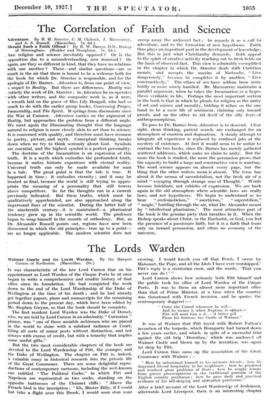The Correlation of Faith and Science
Adventure. By B. H. Streeter, C. M. Chileott, J. Maemurray, and A. S. Russell. (Macmillan. 7s. 6d.).
Should Such a Faith Offend ? By E. W. Barnes, D.D., Bishop of Birmingham. (Hodder and Stoughton. 7s. 6d.).
, ARE religion and science inevitably opposed ? Or is the opposition due to a misunderstanding, now removed ? Or again, are they so different in kind, that they have no relations with one another ? These—and similar questions—are so much in the air that there is bound to be a welcome both for the book for which Dr. Streeter is responsible, and for the apologia of Dr. Barnes. Adventure is, from one point of view, a sequel to Reality. But there are differences. Reality was mtirely the work of Dr. Streeter; in Adventure he co-operates • with other writers, and the composite work is, as it were, a wreath laid on the grave of Miss Lily Dougall, who had so much to do with the earlier group books, Concerning Prayer, Immortality, and The Spirit. It springs from discussions since the War at Cumnor. Adventure carries on the argument of Reality, but approaches the problem from a different angle. We meet again the illuminating thought that the language natural to religion is more closely akin to art than to science. It is concerned with quality, and therefore must have recourse to poetry, picture, and myth. Conceptual thinking breaks down when we try to think seriously about God. Symbols are essential, and the highest symbol is a perfect personality.
The doctrine of the Incarnation is an expression of this truth. It is a myth which embodies the profoundest truth, because it unites historic experience with eternal reality. Universal truth can only be made available for man in a tale. The great point is that the tale is true. It happened in time ; it embodies eternity ; and it may be treated as final, because the world is still trying to appro- priate the meaning of a personality that still towers above competitors. So far the thoughts run in a current previously indicated. But these truths, which must be qualitatively apprehended, are also approached along the impersonal lines of the scientist. During the latter half of the nineteenth century—it is maintained—a pharisaical tendency grew up in the scientific world. The professor began to wrap himself in the mantle of orthodoxy. But, as Dr. Alexander Russell points out, regions have now been discovered in which the old principles—true up to a point— are no longer applicable. The modern scientist does not
sweep away the awkward fact ; he regards it as a call to adventure, and to the formation of new hypotheses. Faith thus plays an important part in the development of knowledge. But this is just what Christianity demands. Both appeal to the spirit of creative activity reaching out to fresh fields on the basis of observed fact. This view is admirably exemplified in the chapter in which Dr. Streeter deals with Christian morals, and accepts the maxim of Nietzsche, "Live dangerously," because he completes it by another, "Live constructively." The ethics of sex have seldom been mcire boldly or more wisely handled. Mr. Macmurray maintains a parallel argument, when he takes the Incarnation as a hypo- thesis verifiable in life. Perhaps the most important section in the book is that in which he pleads for religion as the unity of art and science and morality, bidding it refuse on the one hand to be a mere life of sentiment, claiming only inward proofs, and on the other to rid itself of the silly fears of anthropomorphism. "
To pass to Dr. Barnes from Adventure is to descend. Clear sight, clean thinking, patient search, are exchanged for an atmosphere of emotion and dogmatism. A steady attempt to integrate all experience is replaced by confused jabs at the mystery of existence. At first it would seem to be unfair to contrast the two books, since Dr. Barnes has merely 'gathered scattered addresses, which make no claim to unity. But the more the book is studied, the more the persuasion grows that the capacity to build a large and constructive view is wanting. The word science appears on almost every page, but the thing that the other writers mean is absent. The term has about it the aroma of sacerdotalism, not the fresh air of a mind "voyaging through strange seas of Thought." Words become brickbats, not vehicles of expression. We are back again in the old atmosphere where scientific laws are really laws, and not hypotheses. We begin to understand as we hear "ecclesiasticism," "asceticism," "superstition," "magic," hurtling through the air, what Dr. Alexander meant by "intellectual pharisaism." The most attractive part of the book is the genuine piety that breathes in it. When the Bishop speaks about Christ, or the Eucharist, or God, you feel 'the presence of a passionate faith, but it is a faith that leans only on inward persuasion, and offers no economy of the universe.










































 Previous page
Previous page